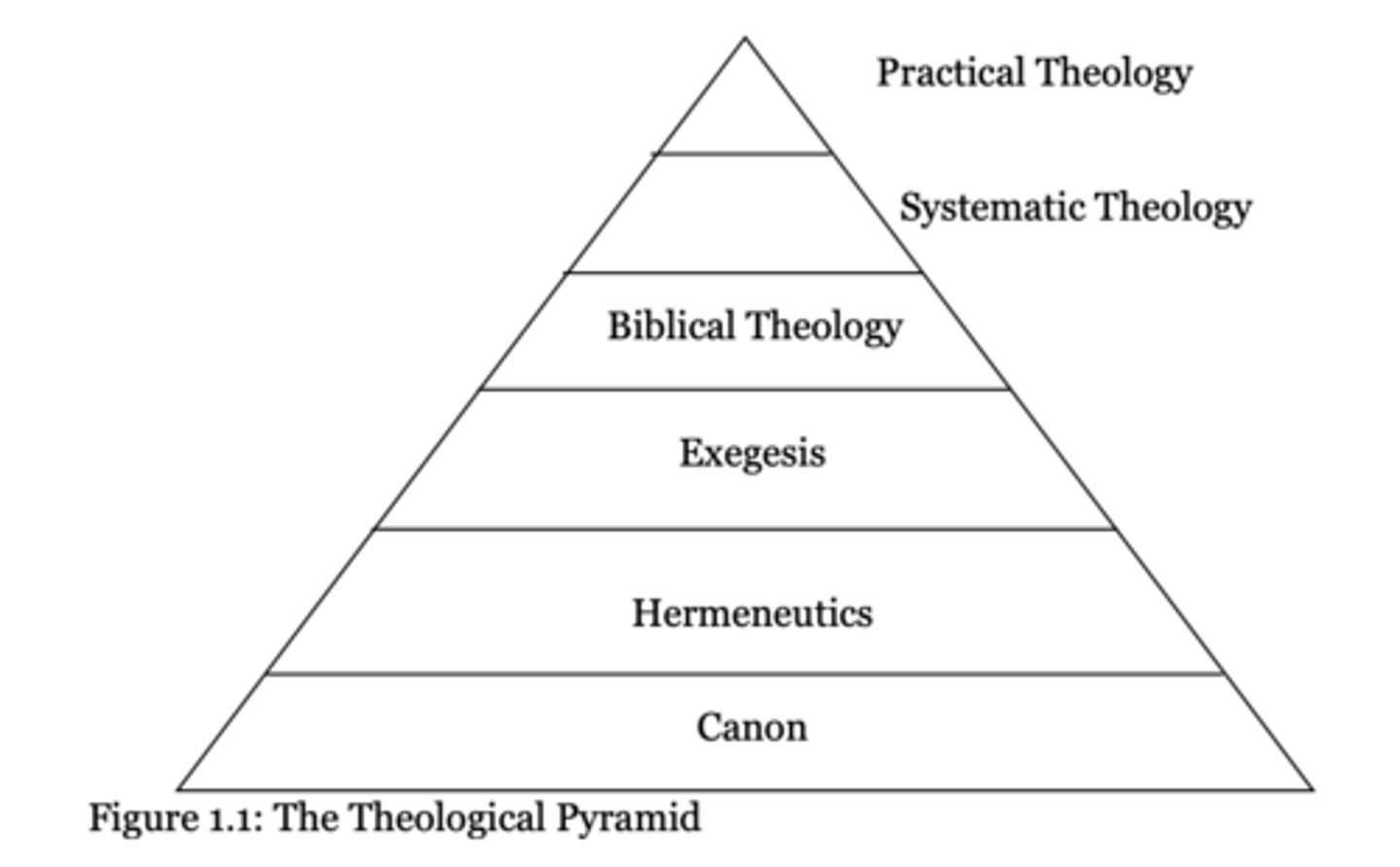Christian Theo Mid Term WE GOT THIS! IT’S NOT ABOUT THE DOG IN THE FIGHT, IT’S ABOUT THE FIGHT IN THE DOG! Success is not final; failure is not fatal: It is the courage to continue that counts! The Best Preparation For Tomorrow Is To Do Your Best Today!
1/63
There's no tags or description
Looks like no tags are added yet.
Name | Mastery | Learn | Test | Matching | Spaced |
|---|
No study sessions yet.
64 Terms
2 Timothy 3:14-17
But as for you, continue in what you have learned and have firmly believed, knowing from whom you learned it and how from childhood you have been acquainted with the sacred writings, which are able to make you wise for salvation through faith in Christ Jesus. All Scripture is breathed out by God and profitable for teaching, for reproof, for correction, and for training in righteousness, that the man of God may be complete, equipped for every good work.
Psalm 73:25-26
Whom have I in heaven but you?
And there is nothing on earth that I desire besides you.
My flesh and my heart may fail,
but God is the strength of my heart and my portion forever.
Bibliology
the study of the doctrine of the inspiration, inerrancy, authority, and canonicity of the Bible
Canon
the list of all the books that belong in the Bible (from the Greek kanōn, "reed; measuring rod; standard of measure")
God-breathed
A translation of the Greek "theopneustos" (sometimes translated "inspired by God", which the Bible (2 Tim 3:16) uses metaphorically to describe the words of Scripture as being spoken by GOD.
Perspicuity
An older term for the clarity of Scripture
Plenary Inspiration
The idea that all the words of Scripture are God's words plenary meaning "full."
Scripture
The writings of the Old and New Testaments, which have historically been recognized as God's words in written form. Another term for the Bible.
Sufficiency
The idea that Scripture contained all the words of God he intended his people to have at each stage of redemptive history, and that it now contains all the words of God we need for salvation, for trusting him perfectly, and for obeying him perfectly.
Self-Attesting
The self-authenticating nature of the Bible by which it convinces us that its words are God's words.
Inerrant
The idea that Scripture in the original manuscripts does not affirm anything that is contrary to fact.
Clarity
the idea that the Bible is written in such a way that its teachings are able to be understood by all who will read it seeking God's help and being willing to follow it.
Infallible
The idea that Scripture is not able to lead us astray in matters of faith and practice.
General Revelation
The knowledge of God's existence, character, and moral law that comes through creation to all humanity.
Special Revelation
God's words addressed to specific people, including the words of the Bible. This is to be distinguished from general revelation, which is given to all people generally.
Theology Proper
the study of God, the Father
incomprehensible
Not able to be fully understood. As this applies to God, it means that God cannot be understood fully or exhaustively, although we can know true things about God.
Knowable
A term referring to the fact that we can know true things about God, and that we can know God himself and not simply facts about him.
Aseity
Another name for the attribute of God's independence or self-existence
Communicable Attributes
Aspects of God's character that he shares or "communicates" with us
Incommunicable Attributes
Aspects of God's character that God does not share with us.
Omnipresence
The doctrine that God does not have size or spatial dimensions and is present at every point of space with his whole being, yet God acts differently in different places.
Eternity
When used of God, the doctrine that God has no beginning, end, or succession of moments in his own being, and that he sees all time equally vividly yet sees events in time and acts in time.
Impassible
The doctrine, often based on a misunderstanding of Acts 14:15, that God does not have passions or emotions. (The belief that God is incapable of suffering harm in the sense that his being cannot be changed or harmed by anything outside of himself.)
Christology
The study of Jesus Christ
Faithfulness
The doctrine that God will always do what he has said and fulfill what he has promised.
Goodness
The doctrine that God is the final standard of good, and that all that God is and does is worthy of approval.
Theophany
An appearance of God in which he takes on a visible form to show himself to people.
Trinity
The doctrine that God eternally exists as three persons - Father, Son, and Holy Spirit - each person is fully God, and there is one God.
What is the Theological Pyramid?
the order of how we do the work of/study theological
Canon, hermeneutics, exegesis, Biblical theology, systematic theology, practical theology

What is systematic theology?
- answers the question, "What does the whole Bible teach us today about any given topic?
- synthesizing relevant biblical passages
How do the different levels in the theological pyramid relate to each other?
They build on top of each other in a progression starting with canon which is the foundation.
canon
what do I study to understand theology?
inspiration, inerrancy, authority, sufficiency
hermeneutics
How do I understand the text?
the science of interpretation
literal, grammar, historical method
Exegesis
What does the text mean?
exegetical; translation, vocab, grammar, forms, structure, syntax
Biblical Theology
What does an individual author, section in historical development say?
limited/themes
Systematic Theology
What does the Bible say on any given topic?
a "system" or outline of Doctrine
unifies the "fruit" of Biblical Theo
Practical Theology
how does it apply to my life? (pastoral theology)
What is Doctrine?
what the whole Bible teaches us about a particular topic
what does systematic suggest?
- that there are carefully organized topics studied in a consistent way
- "gold panning" the text

Why should Christians study theology?
1 - it enables us to KNOW what the Bible says
2 - it allows us to FULFILL the second part of the great commission
3 - it BENEFITS our lives (overcome wrong ideas//make better decisions//grow)
levels of doctrine
Absolutes, convictions, opinions, questions
absolutes
define the core beliefs of the Christian faith (1 Cor 15:3)
key elements of the Gospel
you can't deny this and still be a christian
convictions
have significant impact on health and effectiveness of church
a minor doctrine
you can disagree and still be a Christian
opinions
less clear issue
not worth dividing over/or leaving church
questions
currently unsettled issues
How should we study Systematic Theology?
1. In dependence on God through prayer,
2. with humility (1 Cor 8:1... knowledge that's puffed up),
3. with reason, help from others, and understanding all of the relevant passages.
The Different Forms of the Word of God
Jesus Christ (John 1:1-14, Heb 1:1-2)
and Speech by God (God's decrees, God's Words of personal address, God's Words as Speech Through Human Lips, God's Words in Written Form)
What are the different stages of the canon?
1. The 10 Commandments
2. The Deuteronomic Law of Moses
3. The words of Joshua
4. The prophets
5. The New Testament Canon
Canonicity/Tests of Canonicity
[discover not determine what is in canon]
1. Apostolic Authority
2. Antiquity
3. Orthodoxy
4. Catholicity
5. Traditional Use
6. Inspiration
canon is closed
1. God's canon has always been closed
2. God has alone added to the canon
3. The canon is closed today
What is the authority of Scripture?
to disbelieve or disobey any word of Scripture is to disbelieve or disobey God.
All the words in Scripture are God's Words.
What key passages support authority?
Jeremiah 23:16-22 - false prophets
2 Timothy 3:14 - knowing from whom you leaned it
Luke 24:25 - Jesus rebukes the disciples for not believing the OT.
In what area of life are the Scripture authoritative?
All areas!
Demonstrated in Science and History
What is the inspiration of Scripture?
God through His Spirit inspired every word penned by the human authors of the Bible in the original manuscripts
The words of scripture are spoken by God
influence of HS
What key passages support inspiration?
2 Timothy 3:16-17 - God-breathed
What is the inerrancy of Scripture?
The inerrancy of Scripture means that Scripture in the original manuscripts does not affirm anything that is contrary to fact.
entirely true and never false in all it affirms
Who was Harold Lindsell?
Author of the Battle for the Bible
"wholly trustworthy in matters of history and doctrine"
What was the ICBI and the Chicago Statement?
International Council on Biblical Inerrancy
started inerrancy movement...
Development of the Chicago Statement on Inerrancy
"Declaration of Independence for inerrancy"
What is the sufficiency of Scripture?
the doctrine in general --> every area of our lives, sola scriptura
the doctrine in particular --> sufficiency means that God has provided, in His Word, all that man needs to know concerning matters of life and and how to live a godly life
What key passages support sufficiency?
2 Peter 1:3-4 - everything pertaining to life and godliness
2 Tim. 3:16-17 - equips for every good work
What are the proofs that God exists?
Cosmological, Teleological, Ontological, Moral
What are the categories of God's attributes and what do they mean?
Communicable (can be known) and Incommunicable (can't be known)
Still learning (63)
You've started learning these terms. Keep it up!